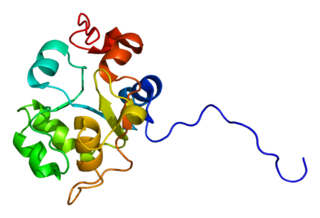| ubiquitin specific peptidase 26 | |
|---|---|
| Identifiers | |
| Symbol | USP26 |
| Entrez | 83844 |
| HUGO | 13485 |
| OMIM | 300309 |
| RefSeq | NM_031907 |
| UniProt | Q9BXU7 |
| Other data | |
| EC number | 3.1.2.15 |
| Locus | Chr. X q26.2 |
USP26 is a peptidase enzyme. The USP26 gene is an X-linked gene exclusively expressed in the testis and it codes for the ubiquitin-specific protease 26. [1] The USP26 gene is found at Xq26.2 on the X-chromosome as a single exon. The enzyme that this gene encodes comprises 913 amino acid residues and it is 104 kilodalton in size, which is transcribed from a sequence of 2794 nucleotide base-pairs on the X-chromosome. [2] The USP26 enzyme is a deubiquitinating enzyme that places a very significant role in the regulation of protein turnover during spermatogenesis. It is a testis-specific enzyme that is solely express in spermatogonia and can prevent the degradation of ubiquitinated USP26 substrates. [3]

Deubiquitinating enzymes (DUBs), also known as deubiquitinating peptidases, deubiquitinating isopeptidases, deubiquitinases, ubiquitin proteases, ubiquitin hydrolases, ubiquitin isopeptidases, are a large group of proteases that cleave ubiquitin from proteins and other molecules. Ubiquitin is attached to proteins in order to regulate the degradation of proteins via the proteasome and lysosome; coordinate the cellular localisation of proteins; activate and inactivate proteins; and modulate protein-protein interactions. DUBs can reverse these effects by cleaving the peptide or isopeptide bond between ubiquitin and its substrate protein. In humans there are nearly 100 DUB genes, which can be classified into two main classes: cysteine proteases and metalloproteases. The cysteine proteases comprise ubiquitin-specific proteases (USPs), ubiquitin C-terminal hydrolases (UCHs), Machado-Josephin domain proteases (MJDs) and ovarian tumour proteases (OTU). The metalloprotease group contains only the Jab1/Mov34/Mpr1 Pad1 N-terminal+ (MPN+) (JAMM) domain proteases.
Contents
Recent research has suggested that defects in USP26 may be involved in some cases of male infertility, [1] [4] specifically Sertoli cell-only syndrome, and an absence of sperm in the ejaculate (azoospermia). [5]
Male infertility refers to a male's inability to cause pregnancy in a fertile female. In humans it accounts for 40–50% of infertility. It affects approximately 7% of all men. Male infertility is commonly due to deficiencies in the semen, and semen quality is used as a surrogate measure of male fecundity.














